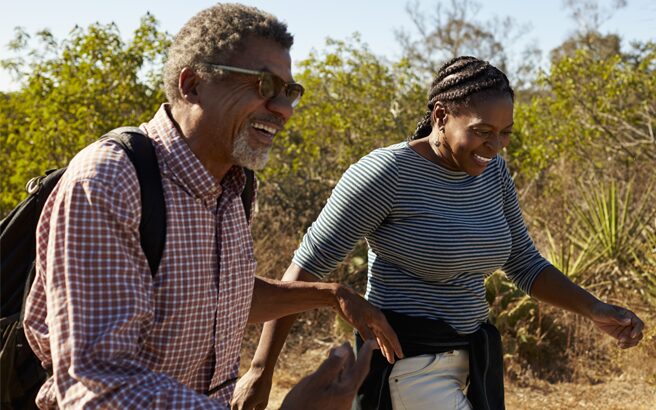 Ifigeneia Bourgiezi and Anna Diaz Font work in World Cancer Research Fund (WCRF) International’s Research Funding and Science Activities team. Here they take a look at the emerging increase in cancer research around survivors, their quality of life and nutritional advice to support survivorship.
Ifigeneia Bourgiezi and Anna Diaz Font work in World Cancer Research Fund (WCRF) International’s Research Funding and Science Activities team. Here they take a look at the emerging increase in cancer research around survivors, their quality of life and nutritional advice to support survivorship.
Increasing numbers of people are managing to survive cancer with ever more chronic conditions. Scientific evidence to underpin supporting them with sound nutritional advice is, however, sparse. This means that there is currently very little advice for people living with a cancer diagnosis – whether still undergoing treatment or in remission – on what dietary and physical activity pattern they need to adopt in order to improve their quality of life and live longer.
However in recent years more focus has been put into research around cancer survivorship due to a better understanding of the mechanisms linking diet, obesity and sedentary lifestyle with cancer; such as the lack of regulation of cell cycle control or the alteration of various growth factors.
Latest research, outreach and conferences
At a conference in December 2017 organised by the Royal Society of Medicine and the Nutrition Society, Prof Elio Riboli, Director of the School of Public Health at Imperial College London, underlined that the recent European Prospective Investigation into Cancer and Nutrition (EPIC) has found that nutrition, anthropometric characteristics and physical activity play a stronger role in the risk of premature death and overall survival than previously thought. This is a very important finding.
Other highlights from the conference included Prof Alessandro Laviano, Professor of Internal Medicine at Sapienza University in Rome, presenting on the value of nutritional support in advanced cancer patients. He highlighted that emerging data shows that accommodating patients’ energy and protein requirements and providing specific nutrients are linked to improved clinical outcomes.
Another highlight was Dr Anne McTiernan from the University of Washington Schools of Medicine and Public Health who is a Research Professor in Epidemiology. She emphasised that the presence of comorbidities and lower levels of physical activity and fitness are some of the strongest predictors of early mortality among cancer survivors.
Overall, this high-profile conference raised important issues on how diet and physical activity can support patients to survive and live longer after a cancer diagnosis; and underlined the role of the UK’s National Institute for Health Research (NIHR) Infrastructure Collaboration to bring coherence between nutrition and cancer.
The NIHR collaboration with WCRF
The long-term aim of the NIHR Infrastructure Collaboration is to improve the nutritional care and advice that patients receive by bringing coherence to existing activities in nutrition and cancer. Coordinated by the NIHR Southampton Biomedical Research Centre (BRC) and facilitated by the NIHR Office for Clinical Research Infrastructure (NOCRI) and WCRF, this collaboration has five main strategic aims:
- To identify knowledge gaps in nutrition at all stages of life in relation to cancer.
- To raise awareness of opportunities for improved research to benefit patients and the public at all stages of the cancer process.
- To enable translational research that will address identified knowledge gaps in nutrition at all stages of life in relation to cancer.
- To foster a community of clinicians, patients, the public, and researchers to share knowledge, understanding and best practice to jointly deliver the highest quality research.
- To build capacity and capability in the health workforce among all disciplines and at all levels; developing the next generation of researchers and clinicians.

Ultimately, the main objective of the NIHR Infrastructure Collaboration is to help patients to have a voice about what research they feel is needed among research organisations, as well as to support clinicians to improve their clinical care and to keep up-to-speed with emerging cancer research findings.
An interdisciplinary challenge
The continued improvement in cancer prognosis will lead to new and possibly unexpected challenges that will have an impact on mechanistic research as well as on medical treatment and public health policy. The main objective now should be to bring together a range of interdisciplinary stakeholders in order to achieve coherence on existing activities and provide a coordinated framework for future research into nutrition and cancer.
Looking at how to increase quality of life after a cancer diagnosis is becoming a recurring theme at past and future conferences – such as the Cancer Survivorship Symposium in Florida – but more focused research is needed to cover the gaps in evidence on the role of nutrition in cancer treatment and survivorship.
> At WCRF we fund research into cancer prevention and cancer survivors through our grant programmes
